#He reads Austen!!
Explore tagged Tumblr posts
Text

jason reading
#dc comics#batfam#dc fanart#red hood fanart#red hood#batfam fanart#bat family#batfam fanartist#jason todd#jason todd has a cleft lip i don't care what you think#jason todd fanart#please guys let him read something other than jane austen#he's probably reading the picture of dorian grey or like the communist manefesto
4K notes
·
View notes
Text

fast sketch of ominis & fast intro to the ominis longfic I'm working on!! This is going to be the most self-indulgent pride and prejudice ripoff that ever existed, 100% based on the ominis of my oneshot💘
I am just OBSESSED with exploring the idea that he’s a natural legilimens & OBSESSED with the thought that he thinks too much for his own good🫶🫶🫶

Ominis Gaunt has always suspected he is cold-blooded.
It makes sense, really.
He always seems to be cold: frigid, long fingers that are often stiff and difficult to move; goosebumps raising the skin of his arms and the back of his neck any time he walks through the drafty halls of the dungeons; even his eyes, he has been told, are reminiscent of ice. They are apparently quite unsettling. The only time he feels comfortable in his body is when he basks in the heat of the sun.
His earliest memory is of the cold. It went like this: he was four years old: his older brother, Marvolo, had led him outside as a joke, he swore up and down that it was just a small joke, and how was he supposed to know that poor, blind Ominis would not be able to find his way back home? When his parents had finally found him, his frail mother sobbing and holding his tiny, blue, hypothermic body to her chest, Ominis remembers feeling quite perturbed at the disturbance. Couldn’t he just be left alone, in the silent soft snow?
He does not know if he has ever felt warm since.
As he strides through the dungeons, the copious amount of warming charms he casts on himself do not seem to be enough, but he keeps casting them anyways and also: wrapping his wool scarf more tightly around his neck, quickening his pace in the hopes that blood flows more easily through his limbs, wishing that he had remembered his gloves. Winter is always a terrible time of year (this winter more terrible than usual), and every breath of warm air leaves his lips reluctantly. How he wishes that he could just hold on to it a bit longer and yet the warmth leaves him precisely fifteen traitorous times a minute, the frigid air gleefully entering and burning its way down his throat in response. Maybe it’s a punishment of some sort.
His whole life has been defined by punishments and sometimes he preoccupies himself with the thought that it is the only way he can view the world. Most of the punishments are manifested in curses inherited from his family. (His parents and Marvolo insist that they are gifts, but Ominis begs to differ.)
First, his blindness: the only true punishment-curse that even his family rejects: caused by inbreeding, no doubt. He did not cry after his birth and his mother cradled his tiny body in silent arms, lovingly whispering nonsense-evil-Parseltongue to him but when he opened his eyes and she saw a brilliant celestine blue with no iris, she screamed in horror and shattered the frigid peace of the room. His parents tried everything to fix him, make him whole, throwing money at various possible solutions to no avail. Magically induced disabilities are not, apparently, curable by magic.
Ominis is not sure that he hates being blind, although he suspects everyone thinks that he should. It is as much a part of him as his fifteen-breaths-per-minute, and he thinks that vision is not all it’s cracked up to be. He is always terrified at the thought that his tenuous hold on sanity is only due to the fact that he cannot see, until he realizes he shouldn’t be terrified of hypothetical situations that cannot come to pass. He consoles himself with the thought that maybe, if he has had to give up his vision for his sanity, it is a small price to pay. Although, he also thinks sometimes that it would be nice to live a life without any morality holding him back.
He is entirely too introspective, after all.
It is precisely this introspection that is his downfall in this moment (and his cold blood). Ominis is so busy casting warming charms on himself and thinking in circles that he cannot use his wand to help him sense his environment and so he should not be surprised when he crashes into her.
And yet he is. Terribly surprised.
Maybe if he were not so caught up in his own thoughts he could have paid more attention to his surroundings. Instead, he spent too much time ruminating on his reptilian heritage and has now barreled head first into his arch-nemesis.
Rosalie Harris.
The girl who has stolen his oldest friend from him.
The girl who is currently making angry noises as she clambers to her feet and is picking up the things that he has crashed everywhere. Even if he could see, Ominis is not sure he would help her. Helping her would be akin to betraying himself, after all.
“Hey! Watch where you’re - oh, hello, Ominis.”
“Rosalie,” he says shortly, nodding his head where he thinks she might be standing and stepping to the side. He tightens his grip around his wand, feeling the texture of the wood change from rough to smooth as he runs his thumb down it. Smooth where he always seems to worry it, rough where the wood refuses to yield to the brushes of his thumb.
He surreptitiously casts the spell - he has at least done it so many times he no longer needs to say it out loud - and his surroundings light up. Or, he supposes that is the most apt description, considering he cannot actually differentiate between light and dark. He senses Rosalie’s silhouette to his left - she is standing with her arms crossed and her foot taps impatiently as she waits for him.
Waiting for what? he thinks, slightly irritated. She never seems to leave him alone and he wracks his brain trying to think of something, anything he can say to get rid of her.
Maybe if he speaks in Parseltongue, she would finally be scared away for good. He does not really want that second reminder of his family’s curse, though.
His family preferred speaking in Parseltongue with each other, believing the ability made them morally superior to everyone else and Ominis had not even realized until he had arrived at Hogwarts that no, it was not normal. When his name had been called at the Sorting, furious whispers had erupted amongst all the students, and his every step (terrified, confused, unsure - he had still been getting used to using his wand to navigate his surroundings) to the stool at the front of the Great Hall was plagued with a susurration reminiscent of snakes. Except these whispers, sneaking their way into his mind, had been unkind and overwhelming.
(He had not realized in that moment that he was also hearing their thoughts.)
Maybe now, with Rosalie standing in front of him and just annoyingly waiting for Merlin-knows-what, Ominis should use his Legilimency to find out what Rosalie wants. (He hates it, though.) It would not be difficult. (The thought makes him shiver in horror because he doesn’t want to abuse the ability.) He can feel the edges of her mind, her magic, and all he has to do is reach out - she is right there, and -
“Ominis?”
Her arms are crossed, he hears an impatient huff.
Why hasn’t she left him alone yet?
Hadn’t the Hogwarts Express already left the station, bringing all of the students home for the winter holiday? Ominis had thought he would be one of the only students left in the castle, and if he is being honest with himself, he had been looking quite forward to having the place to himself.
Ominis’s winter has just gotten infinitely worse.
Going to Gaunt Manor for the holidays is out of the question (he will not think about the nightmares that have been plaguing him ever since he received the owl demanding he go home), and Ominis does not want to be more of a burden to the Sallows. They already do enough for him over the summer, and Sebastian and Anne have convinced him to go to Hogsmeade with them at least twice over the next two weeks. Besides, with Anne’s curse progressing, Ominis does not want to be in the way.
“Why are you still here?” Ominis asks. He knows his voice comes across as cold as his blood, blunt, but he cannot help himself. Ever since Rosalie arrived - her entrance to Hogwarts also causing quite the stir - Ominis has been intensely annoyed by her presence. She is too happy. Too carefree. Too…well, everything he is not.
And, she does not seem to leave him alone.
Rosalie is always there, always hanging around Sebastian. (Taking Sebastian away.) He even showed her the Undercroft, which had almost caused a rift in their relationship. Ominis could not believe that Sebastian would be so careless, showing someone who for all intents and purposes is crashing her way into their lives, forcing them to pay attention to her. They barely even knew her, and yet Sebastian thought it was a good idea to show her such a sacred place?
(It does not help that she is intelligent, and Ominis has caught himself on more than one occasion about to ask her about her opinion on something before he catches himself.)
“I was looking for you.”
Ominis tilts his head at that and fiddles with his ring. He considers walking away, leaving -
“I mean…Sebastian said that you were also going to be here over the holidays and since everyone else just left I thought -”
“Thought what?” Internally, Ominis winces at the biting tone to his voice. It came out harsher than he intended, his voice loud and echoing through his mind, bouncing off the cold, stone walls surrounding them.
#the girl’s name and gender tbh is subject to change#I’m having a lot of fun writing this up but it was all just written up on a whim#idk when I’ll FULLY be able to commit to this#but I always have so much fun writing his POV#SO I HOPE YOU ENJOY!!! & forgive the messy sketch😆#honestly most of this is subject to be edited and/or changed#bc you are getting my writing before any editing whatsoever here😳#I just love the idea of Ominis being so full of conflicting pride and shame and lots of confusion#and the love interest to be so annoying and bratty and headstrong#basically an Elizabeth Bennet you know…she always thinks she’s right (she isn’t) and her first impressions are the law#I’m actually reading Mansfield Park now…Jane Austen please bless me as I write tonight😌🙏#hogwarts legacy#hogwarts legacy fanart#hphl#ominis gaunt fanfiction#ominis#ominis x mc#hogwarts legacy ominis#ominis gaunt#ominis gaunt fanart#also I have WAY MORE WRITTEN!!! mostly just unconnected ramblings from his pov about how he thinks about life#& snapshots of his first year at Hogwarts 🥺🥺🥺#I really am an Ominis girl…#hogwarts legacy fanfic
156 notes
·
View notes
Text
The first time I read Jane Austen's novels, I was about the age of most of the heroines. A year or two younger than confident Elizabeth Bennet, a few years older than naive Catherine Morland, etc. For the most part, I didn't even think about it.
I vividly remember re-reading Persuasion when I was the precise age of Anne Eliot. She was even born in '87 (1787), while I was born in '86 (1986), so whenever they mentioned years in the past, I knew just how old she was at that time and just where I had been in life at the same age. (She and Wentworth broke up in '06, for instance, which was my sophomore year of college.) It was a fascinating experience, especially considering how much of that book is specifically ABOUT her age and her point in life.
....I am now rereading Sense and Sensibility at the age of 38, which means I am the age of Colonel Brandon and Mrs. Dashwood, rather than Elinor and Marianne and I CANNOT stop thinking about it.
#jane austen#reading#literature#i could probably write a long post about how my views of characters have changed over time#like when you're a kid and watching Little Mermaid and you are totally on ariel's side#and then you get a decade or two older than her and you're like#ok her dad overreacted but also he had a point.#my feelings about heroines like marianne and fanny have changed a good bit over the years
280 notes
·
View notes
Text

Pride & Prejudice by Jane Austen
#are you going to tell me I’m wrong????#fuck the patriarchy#dismantle the patriarchy#why do men#I know Collin’s is fictional BUT HOLY SHIT DOES HE ENRAGE ME#the feminine rage this emits from a BOOK#Jane Austen#Pride and prejudice#elizabeth bennet#Mr Collin’s#Mr Darcy#books#book blog#reading#bookblr#can I castrate this man.
483 notes
·
View notes
Note
So I could be totally wrong but, I believe it was sort of expected that men/gentlemen lose their virginity before marriage in regency times. But I also there’s some fandom ‘debate’ about whether or not Mr Darcy would’ve had sex before getting married. So I was just curious about what your canon for Mr Darcy in T3W is. Is he a virgin or not?
I knew someone would ask me this eventually, haha. I've actually had really long conversations with my beta reader about this trying to figure it out. It sounds like this might all be stuff that you’ve already seen discussed in the fandom, but I’ve never thought about it deeply before and so these are new thoughts to me.
I keep going over the historical real-world likelihood, the authorial intent, and the text itself but I’m still not 100%. I’ll explain my thinking and what I find most likely, but here’s your warning that it’s not a clear cut yes/no.
Because on one hand, at that time period it was most common for men in his position to have seen sex workers or have casual encounters/mistresses with women from their estates. Though I do absolutely believe not all men did that, no matter how much wealth and power they had. To go back some centuries, William the Conqueror seemed to be famously celibate (no hints of male lovers either according to the biography I read) until his marriage, and there's no evidence of affairs after it either. The best guesses as to why are that it was due to his religious devotion and the problems that had arisen from himself being a bastard and not wanting to recreate that situation. Concerns over religion and illegitimate children would certainly still have been applicable in the regency to men who thought that way. And in modern times I've seen sex workers say that when an 18/21yo is booked in by his family/friends to 'become a man' often they end up just talking and agree to lie about the encounter. After all, it’s not like every man wants casual sex, even if they aren’t demisexual or something in that vein. But, statistically speaking, the precedent of regency gentlemen would make Darcy not a virgin.
On the other hand, just how aware was Jane Austen, the very religious daughter of a country rector, of the commonness of this? There’s a huge difference between knowing affairs and sex workers existed (and no one who had seen a Georgian newspaper could be blind to this) and realising that the majority of wealthy men saw sex workers at some point even if they condemned the more public and profligate affairs. The literature for young ladies at the time paints extramarital sex - including the lust of men outside of marriage - as pretty universally bad and dangerous. This message is seen from 'Pamela' and other gothic fiction to non-fiction conduct books which Jane Austen would have encountered. Here's something I found in 'Letters to a Young Lady' by the reverend John Bennett which I found particularly interesting as it's in direct conversation with other opinions of the era:
"A reformed rake makes the best husband." Does he? It would be very extraordinary, if he should. Besides, are you very certain, that you have power to reform him? It is a matter, that requires some deliberation. This reformation, if it is to be accomplished, must take place before marriage. Then if ever, is the period of your power. But how will you be assured that he is reformed? If he appears so, is he not insidiously concealing his vices, to gain your affections? And when he knows, they are secured, may he not, gradually, throw off the mask, and be dissipated, as before? Profligacy of this kind is seldom eradicated. It resembles some cutaneous disorders, which appear to be healed, and yet are, continually, making themselves visible by fresh eruptions. A man, who has carried on a criminal intercourse with immoral women is not to be trusted, His opinion of all females is an insult to their delicacy. His attachment is to sex alone, under particular modifications.
The definition of a rake is more than a man who has seen a sex worker once, it's about appearance and general conduct too, but again, would that distinction be made to young ladies? Because they seem to simply be continuously taught 'lust when unmarried is bad and beware men who you know engage in extramarital sex.' As a side note, Jane Austen certainly knew at least something about the mechanics of sex: her letters and literature she read alludes to it, and she grew up around farm animals in the countryside which is an education in itself.
We can also see from this exert that the school of thought seems to be 'reformed rake' vs 'never a rake' in contention for the title of best husband, there's no debate over whether a current rake is unsuitable for a young lady. And, from Willoughby to Wickham to Crawford, I think we have a very clear idea of Jane Austen's ideas of how likely it is notably promiscuous men can reform. This does not preclude the possibility that her disparaging commentary around their lust is based more on over-indulgence or the class of women they seduce, but it's undoubtedly a condemnation of such men directly in line with the first part of what John Bennett says so it's no stretch to believe she saw merit in the follow-on conclusions of the second part as well. Whether she would view it with enough merit to consider celibacy the only respectable option for unmarried men is a bit unclearer.
I did consider that perhaps Jane Austen consciously treated this as a grey area where she couldn’t possibly know what young men did (the same reasoning is why we never see the men in the dining room after the ladies retire, etc) and so didn't hold an opinion on men's extramarital encounters with sex workers/lower-class women at all, but I think there actually are enough hints in her works that this isn’t the case. Though, unsurprisingly, given the delicacy of the subject, there’s no direct mention of sex workers or gentlemen having casual lovers from among the lower-classes in her texts.
That also prevents us from definitively knowing whether she thought extramarital sex was so common, and as unremarkable, as most gentlemen treated it. But we do see from her commentary around the consequences of Maria Bertram and Henry Crawford's elopement that she had criticism of the double standards men and women were held to when violating sexual virtue. Another indication that she perhaps expected good men to be capable of waiting until marriage in the way that she very clearly believed women should. At the very least, a man who often indulges in extramarital sex does not seem to be one who would be considered highly by Jane Austen.
She makes a point of saying, in regards to not liking his wife, that Mr Bennet “was not of a disposition to seek comfort for the disappointment which his own imprudence had brought on, in any of those pleasures which too often console the unfortunate for their folly or their vice.” This must include affairs, though cheating on a wife cannot be a 1:1 equivalent of single young men sleeping around before marriage. However, the latter is generally critically accepted to be one of the flaws that Darcy lays at Wickham’s door along with gambling when talking about their youth and his “vicious propensities" and "want of principle." Though this could be argued that it’s more the extent or publicity of it (but remembering that it couldn't be anything uncommon enough that it couldn't be hidden from Darcy Sr. or explained away) rather than the act itself, or maybe seductions instead of paying women offering those services. I also believe Persuasion mentioning Sunday travelling as proof of thoughtless/immoral activity supports the idea that Jane Austen might have been religious enough that she would never create a hero who had extramarital sex.
So, taken all together this would make Darcy potentially a virgin, or, since I couldn't find absolute evidence of her opinions, leave enough room that he isn’t but extramarital sex isn’t a regular (or perhaps recent) thing and he would never have had anything so established as a mistress.
I’ve also been wondering, if Darcy isn’t a virgin, who would he have slept with? I’ve been musing on arguments for and against each option for weeks at this point. No romantasy has ever made me think about a fictional man's sexual habits so much as the question of Darcy's sexual history. What is my life.
Sex workers are an obvious answer, and the visits wouldn’t have raised any eyebrows. Discretion was part of their job, it was a clean transaction with no further responsibilities towards them, and effective (and reusable, ew) condoms existed at this time so there was little risk of children and no ability to exactly determine the paternity even if there was an accident. It was a fairly ‘responsible’ choice if one wanted no strings attached. In opposition to this, syphilis was rampant at the time, and had been known to spread sexually for centuries. Sex workers were at greater risk of it than anyone else and so the more sensible and risk-averse someone is (and I think Mr Darcy would be careful) the less likely they would be to visit sex workers. Contracting something that was known as potentially deadly and capable of making a future wife infertile if it spread to her could make any intelligent and cautious man think twice.
Servants and tenants of the estate are another simple and common answer. Less risk of stds, it can be based on actual attraction more than money (though money might still change hands), and is a bit more intimate. But Wickham’s called wicked for something very similar, when he dallies (whether he only got to serious flirting, kissing, or sleeping with them I don’t think we can conclusively say) with the common women of Meryton: “his intrigues, all honoured with the title of seduction, had been extended into every tradesman's family.” And it isn't as though Wickham had any personal duty towards those people beyond the claims of basic dignity. Darcy, who is shown to have such respect and understanding for his responsibilities towards the people of his estate and duties of a landlord, would keenly feel if any of his actions were leading his servants/tenants astray and down immoral paths. Servants, especially, were considered directly under the protection of the family whose house they worked in. I think it's undoubtable that Mrs Reynolds (whose was responsible for the wellbeing - both physically and spiritually - of the female servants) would not think so well of Mr Darcy if he had experimented with maids in his youth. It would reflect badly on her if a family entrusted their daughter to her care and she 'lost her virtue' under her watch. Daughters/widows of others living on the estate not under the roof of Pemberley House are a little more likely, but still, if he did have an affair with any of them I can only think it possible when he was much younger and did not feel his duties quite so strongly. Of course lots of real men didn't care about any of this, but Darcy is so far from being depicted as careless about his duties that the narrative makes a point of how exceptional his quality of care was. Frankly, it's undeniable that none of Jane Austen's heroes were flippant about their responsibilities towards those under their protection. I cannot serious entertain an interpretation that makes Darcy not, at his current age, at least, cognizant of the contemporary problems inherent in sleeping with servants or others on his estate.
A servant in a friend’s house would remove some of that personal responsibility, but transfer it to instead be leading his friend’s servants astray and in a manner which he is less able to know about if a child did result. That latter remains a problem even if we move the setting to his college, so not particularly likely for his character as we know it… though it wouldn’t be unusual for someone to be more unthinking and reckless in their teenage years than they are at twenty-eight so I don’t think having sex then can be ruled out. Kissing I can much more easily believe, especially when at Oxford or Cambridge, but every scenario of sleeping with a lower-class woman has some compelling arguments against it especially the closer we get to the time of the novel.
Men did of course also have affairs with women of ranks similar to their own, though given Jane Austen’s well-known feelings towards men who ‘ruined’ the virtue of young ladies we can safely say that Darcy never slept with an unwed middle- or upper-class woman. Any decent man would have married them out of duty if it got so far; but if he was the sort to let it get so far, I think it impossible Jane Austen would consider him respectable. Widows are a possibility, but again, the respectable thing to do would be to marry them. Perhaps a poorer merchant’s widow would be low enough that marriage is off the table but high enough that the ‘leading astray’ aspect loses its master-servant responsibilities (though the male-female ‘protect the gentler sex’ aspect remains) but his social circle didn’t facilitate meeting many ladies like that. Plus, an affair with a woman in society would remove many layers of privacy and anonymity that sex-workers and lower-class lovers provided by simply being unremarkable to the world at large. It carries a far greater risk of scandal and a heavier sense of immorality in the terms of respecting a woman’s purity which classism prevented from applying so heavily to lower-class women.
I think it’s important to note here that something that removes the need to think about duties of landlords towards the lower-classes or gentlemen towards gentlewomen is having affairs with other men of a similar rank. But, aside from the risk of scandal and what could be called the irresponsibility of engaging in illegal acts, it’s almost certain that Jane Austen would never have supported this. For a devout author in this era the way I’m calculating likelihoods makes it not even a possibility. But if you want to write a different fanfiction (and perhaps something like a break-up could explain why Darcy doesn’t seem to have any closer friend than someone whom he must have only met two or so years ago despite being in society for years before that) it does have that advantage over affairs with women of equal- and lower-classes. I support alternate interpretations entirely – it just isn’t how I’m deciding things in this instance.
I keep coming back to the conclusion that, at the very least, Darcy hasn’t had sex recently and it was never a common occurrence. It wouldn’t surprise me if Jane Austen felt he hadn’t done it ever. Kissing, as we can see from all the parlour games at the time, wasn’t viewed as harshly, so I think he’s likely made out with someone before. But in almost every situation it does seem that the responsible and religious thing to do (which Jane Austen values so highly) is for it to never have progressed to sex. I also don’t think it conflicts with his canon characterisation to say that he wouldn’t regard sexual experience as a crucial element of his life thus far, and his personality isn’t driven to pursue pleasure for himself, so it’s entirely possible that he would never go out of his way to seek it. So, I’m inclined to think that the authorial and textual evidence is in favour of Darcy being a virgin even if the real-world contemporary standard is the opposite. (Though both leave enough room for exceptions that I’m not going to argue with anyone who feels differently; and even if you agree with all my points, you might simply weight authorial intent/textual evidence/contemporary likelihoods differently than I do and come to a different conclusion).
Remember that even if Darcy is a virgin this wouldn’t necessarily equate to lack of knowledge, only experience. There were plenty of books and artwork focused on sex, and Darcy, studious man that he is, would no doubt pay attention to what knowledge his friends/male relatives shared. Though some of it (Looking especially at you, 'Fanny Hill, Memoirs of a Woman of Pleasure') should NEVER be an example of appropriate practice for taking a woman's virginity. Darcy would almost certainly have been taught directly or learnt through exposure to other men talking to make sex good for a woman – it was a commonly held misconception (since Elizabethan England, I believe) that women had to orgasm to conceive. It would be in his interests as an empathetic husband, and head of a family, to know how to please his wife.
Basically, I’m convinced Darcy isn’t very experienced, if at all, and will be learning with Elizabeth. But he does have a lot of theoretical knowledge which he’s paid careful attention to and is eager to apply.
#sorry for how my writing jumps around from quoting sources to vaguely asserting things from the books I only write proper essays when forced#if anyone has evidence that Austen thought a sexually experienced husband was better/men needed sex/it's a crucial education for men/etc#PLEASE send it my way I'm so curious about this topic now#this is by no means an 'I trawled through every piece of evidence' post just stuff I know from studying the era and Austen and her work#so more info/evidence is always appreciated#I had sort of assumed the answer was 'not a virgin' when I first considered this months ago btw but the more I thought about it#the less I was able to find out when/where/who he would've slept with without running into some authorial/textual complication#so suddenly 'maybe a virgin' becomes increasingly likely#But the same logic would surely apply to ALL Austen's heroes... and Knightley is 38 which feels unrealistic#(though Emma doesn't have as much commentary on sex and was written when Austen was older so maybe she wasn't so idealistic about men then)#but authors do write unrealistic elements and it's entirely possible that *this* was something Austen thought a perfect guy would(n't) do#and if you've read my finances breakdowns you know I follow the text and authorial voice over real-world logic because it IS still fiction#no matter how deftly Austen set it in the real world and made realistic characters#pride and prejudice#jane austen#fitzwilliam darcy#mr darcy#discourse#austen opinions#mine#asks#fic:t3w#I'm going to need a tag for 'beneath the surface' but 'bts' is already a pretty popular abbreviation haha#just 'fic: beneath' maybe?? idk
81 notes
·
View notes
Text
Darcy's role in P&P would work for me anyway, but tbh it works for me 10x better because he halfway reverts back to form towards the end of the book.
#so many takes on darcy seem to think his presentation of himself at pemberley is a permanent radical transformation of his personality#and the end point of his character arc#and it's explicitly not a static end point in that way#his inwards change is real but how much that translates into outwards presentation depends on the context#like late-novel darcy trying to compliment mrs bennet and doing it in a way that reads as icy and brusque is just peak darcy#the difference isn't that he's become personable in this social context; he's not! but he's doing his best now#and this being an ongoing struggle at which he sometimes comically fails is so much more austen#than the total transformation into a perfect dreamboat narrative#but yeah i love that austen goes out of her way at the end to yank him out of his fulfillment enclosures and underscores his foibles#anghraine babbles#austen blogging#austen fanwank#lady anne blogging#fitzwilliam darcy
534 notes
·
View notes
Text

Coquette Jason while I’m working on my commission sheets and portfolio 🌹💌🩰🕊️✨💋🎀🍒❤️🕯️🩷💀🩸
#he’s reading Jane Austen y’all#I misspelled the books title#it was sense and sensibility#dc#dc jason todd#jason todd fanart#jason robin#jason todd robin#jason todd#jason peter todd#jason wayne#dc redhood#redhood#red hood#red hood fanart#dc comics fanart#dc fanart#dc comics#batfam#batfamily#jaybird#coquette#farmers daughter#lana del rey#fanart#fanartist#dc fanartist#procreate#artists on tumblr#edistormart
540 notes
·
View notes
Text

Mr. Darcy is my first love but that Henry...
#Henry Tilney's undeniable rizz#he reads books and has puppies#one smirk and then we may be rational again#northanger abbey#jane austen#henry tilney#mr darcy#classic lit memes
46 notes
·
View notes
Text

#jason todd reads austen#he read austen#my boy#jason todd#fanart#art#illustration#fan art#batfam#red hood#red hood fanart#jason todd fanart#dc#batman
119 notes
·
View notes
Text
Just when I was talking myself into being normal I find out “Lady Bracknell” was all David Tennant. Chewing glass for real.
#he said yeah as a little character note he hasn’t read Jane Austen but he knows the importance of being earnest#good omens
551 notes
·
View notes
Text

Hilaire Belloc in an essay on Jane Austen
#jane austen#hilaire belloc#love this. key for teaching Austen to boys#he also said in another part of the essay that he believed in the future more men would read her than women#fascinating to me.#I don’t even know if I agree but I love to see someone saying it#he ALSO said at the very beginning that her characters were immortal#and he goes ‘doesn’t mean I don’t forget some of them sometimes when they’re not immediately in front of me’#‘EXACTLY AS I DO IN REAL LIFE WITH REAL PEOPLE’#but he said he would know them every time they reappeared again#anyways. it was a good and funny essay.
60 notes
·
View notes
Text
Mr Darcy: Marrying you would be such a big mistake, it goes against everything my family and friends tell me, and also against what I myself believe, your family suck and quite frankly I have no idea why I love you but I do, so marry me?
Elizabeth: …what.
#guess who’s reading P&P AND finally properly watching the 1995 version for real#(I started it a year or two ago but have had zero time 😭 but I’m 1/2 through now so)#he really gave the worst proposal of all time#mr darcy#fitzwilliam darcy#elizabeth bennet#pride and prejudice#jane austen#pride and prejudice 1995
22 notes
·
View notes
Note
I'm at that point where I've decided that Colin's only fault is that he called Emma a silly novel, and there I can only assume he said that because he's never read it. Especially as I think Colin would love Austen.
I knew my boy was an especially good egg when he brought the women in his life excellent and thoughtful gifts (Eloise's feminist texts from France? Fran's Italian sheet music? That watch for Violet that looks so much like the one Edmund had???) and then got his brothers paperweights and cards lol
Eloise would do a tradesies with him, book for book, and he'd devour Emma. That man's a romantic through and through.
#colin bridgerton#i can't help it he's my favorite and i love him#my boy read emma on eloise's recommendation and then bought out all of austen's books immediately after
20 notes
·
View notes
Text
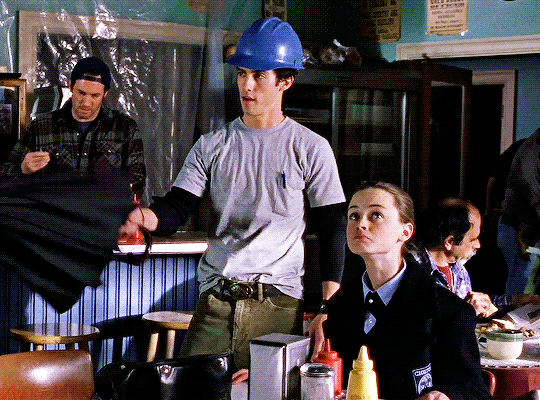
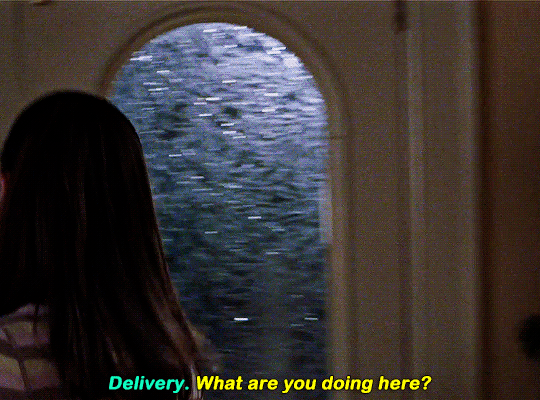



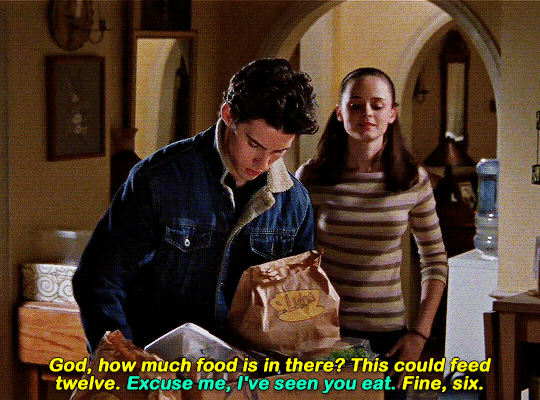


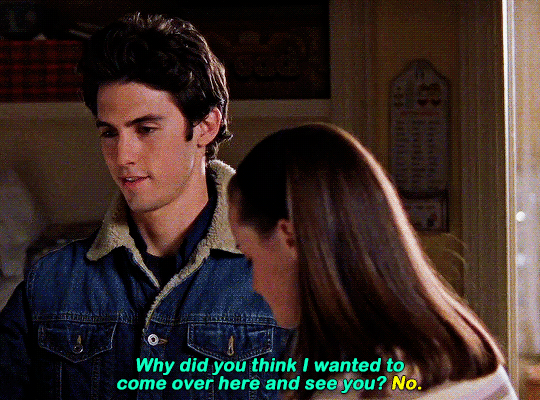

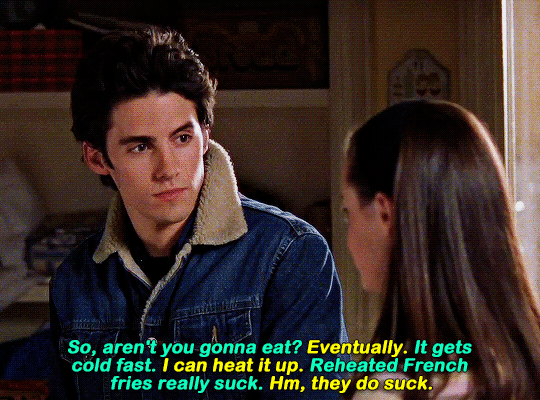
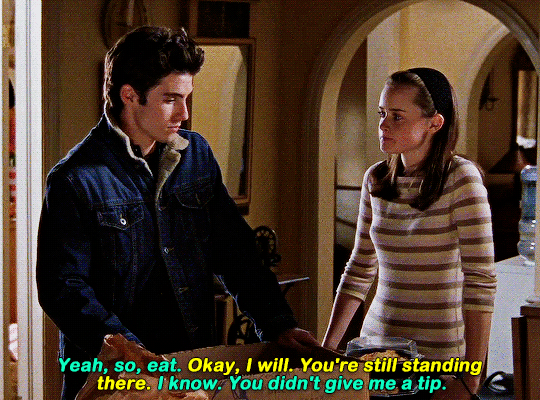

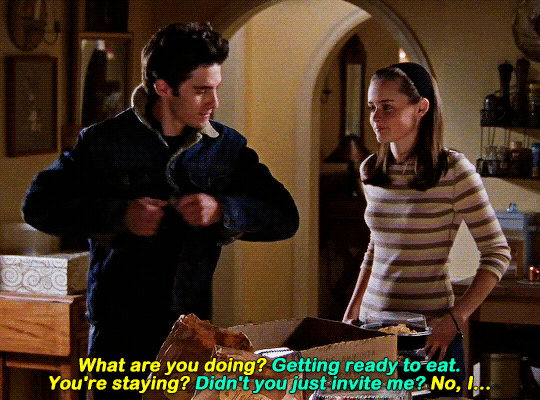
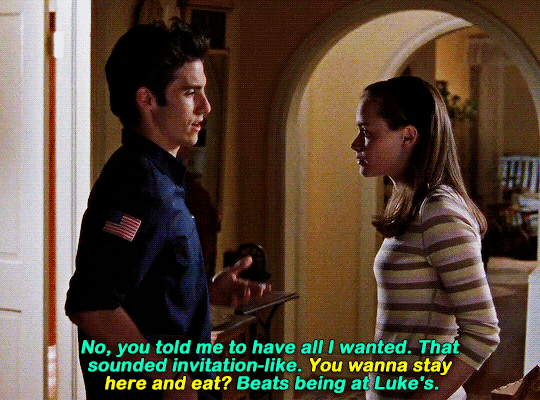
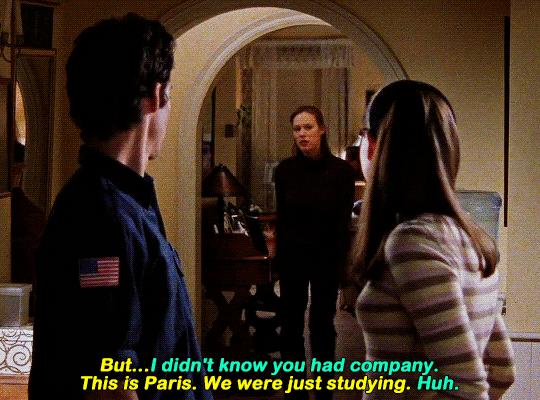

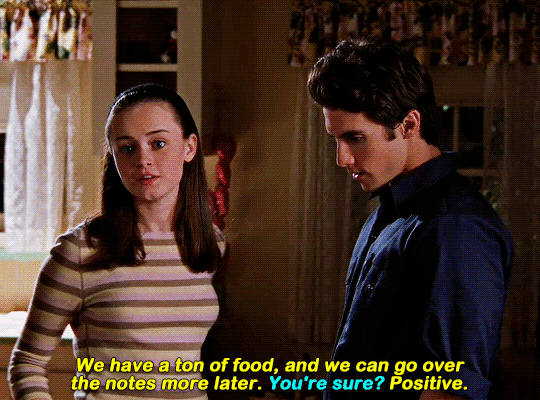
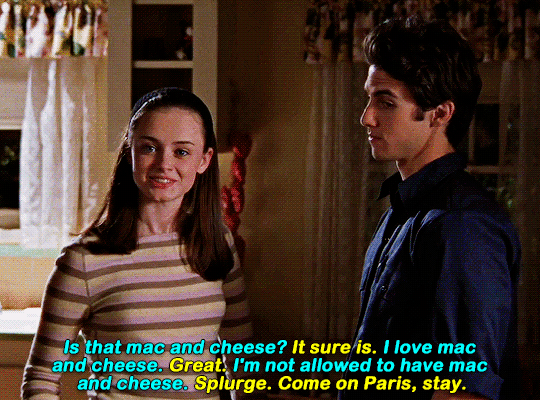
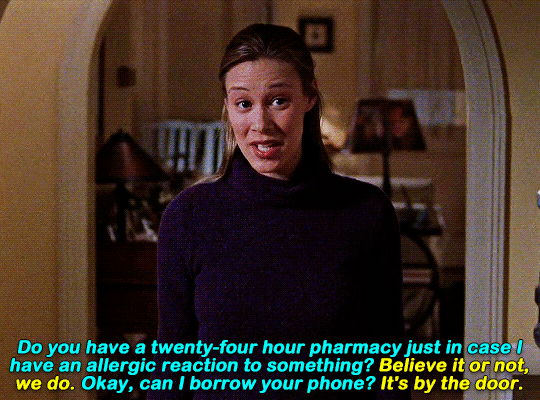
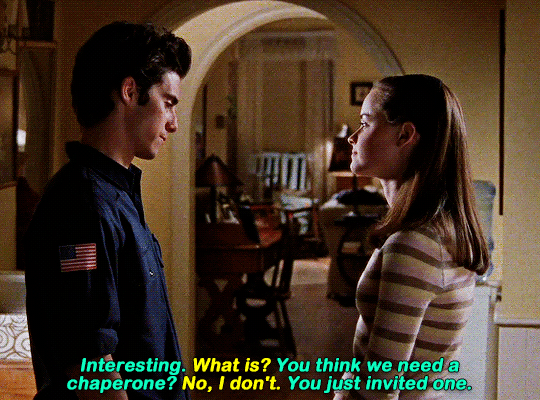
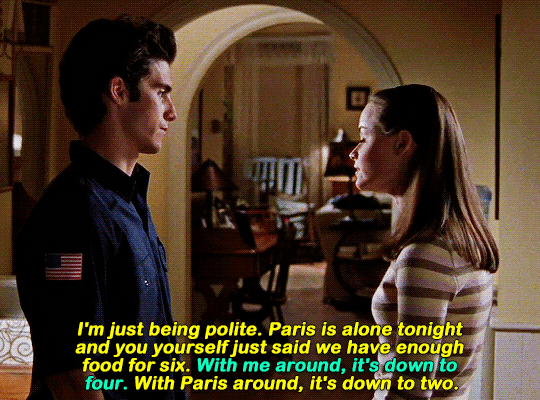
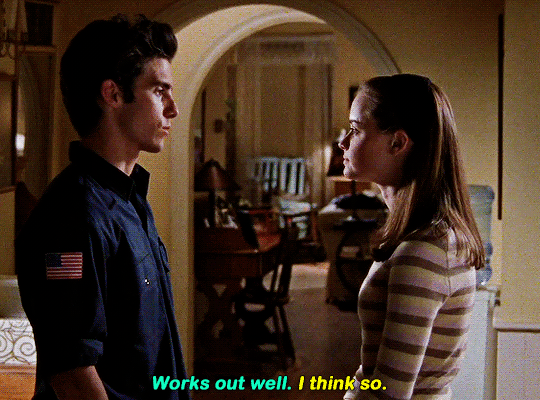
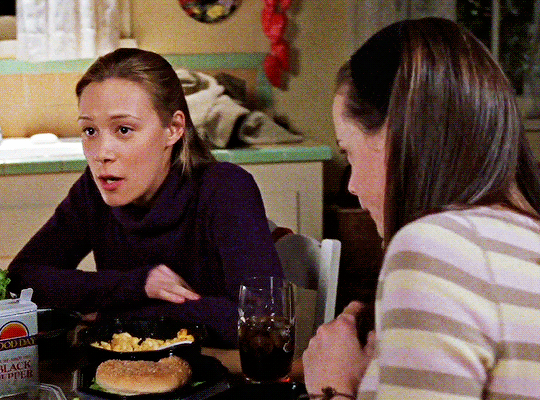

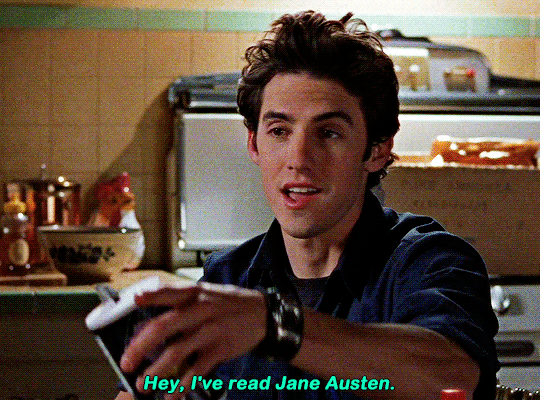

I Am All In Rewatch - Jess & Rory - Episode 2x16 (Part 1)
I like how he you know, how he deals with these situations. He's he's gradually becoming more aggressive and showing up, yet he's still remaining cool. He's not overreacting when he's asked to leave, like, can you get out of here? Because that's insulting, that doesn't feel good. Dean's coming over. You have to get out of here, and he's like, really, uh,..and then he toys with her a little...Because he didn't want to expose his feelings, he wanted to be the cool guy....if he came over and said, listen, you know if he can't, because that's what Dean would do...So Dean represents I think he represents you know, he's a big city kid coming into stars Hollow, but he's completely transformed into Stars Hollow. He doesn't represent anything mysterious anymore, or anything that Rory, you know, has her her sights set on but Jess does. He's interesting, he's mysterious, he's well read, all of these things. He's clever, he's cool under pressure. That's her ticket. -Scott
#i am all in#literati#jess x rory#rory x jess#i love them#faves#jess mariano#rory gilmore#love#IT'S FAST FOOD GOSPEL!!!!#HE'S READ JANE AUSTEN#DID YOU THINK I WANTED TO COME OVER HERE AND SEE YOU???#JESS IS SO LOUD#gilmore girls#milo ventimiglia#alexis bledel#2x16
83 notes
·
View notes
Text
I know many people have asked this before but still how on earth does Grayson Hawthorne flirt?
#he would probably just glare at them with heart eyes while giving the most massive side eyes#or maybe bro would start reciting Jane Austen#he probably studies how to flirt by reading classics#just imagine him studiously memorizing pages from classic novels#and recite them like he is taking a literature class but is in fact trying to flirt😭😭#or he would go to jamie#grayson hawthorne#jameson hawthorne#the inheritance games#lyra kane#avery grambs
91 notes
·
View notes
Text
Currently reading The Shortest History of England by James Hawes and it seems that even when reading non-fiction, I cannot escape Pride and Prejudice:


Thought this was an interesting contextual point. I was aware of the Norman names being a deliberate choice on Austen's part to demonstrate the prestige of the Darcys and de Bourghs (Bennet is one too!)... but I've never seen Pride and Prejudice linked to the British government printing more money to fight Napoleon :')
#pride and prejudice#jane austen#cora reads#british history#i guess i'm enjoying it but the author was a little too harsh on Æthelred the Unready which grinds my gears#he was very unlucky rather than an inherently poor ruler (i wrote an essay about him once so i feel weirdly attached to him lmao!#but it's a bit simplistic... though i guess what can you expect for a popular history book#putting way too much stock in the north/south divide imo but ANYWAY it's good to know your history#especially to make sense of the present. why are we the way we are..... i don't have an answer yet and probably never will#but it's fun(??) to try
14 notes
·
View notes